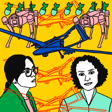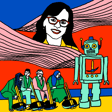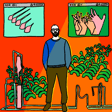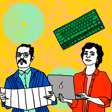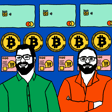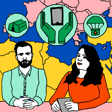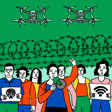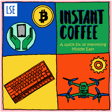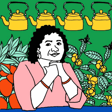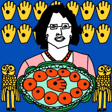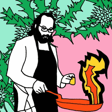Introduction to Season 3: Exploring Technology
00:00:03
Speaker
Welcome to Season 3 of Instant Coffee. I'm Nadine Almanasvi. And I'm Sima Shehad. And this latest season is an exploration of technology and its developments in the region.
Historical Tech Developments: From Medieval to Modern
00:00:14
Speaker
Beyond the emergence of Czech GPT and Sofia the robot, we wanted to speak with people who are applying, adapting and reimagining technology in their fields. We will be exposed to medieval Islamic hospitals, failed Gulf techno cities, emerging Iraqi fintech startups, inclusive artificial intelligence and much more.
00:00:32
Speaker
It would be futile to try and put together a history of technological development in the Middle East in half an hour.
Ahmed Raghab on Medieval Technological Knowledge
00:00:37
Speaker
So we're not going to do that. But with the help of a few historians, we are going to highlight two interesting historical periods that demonstrate the way technology and knowledge production interact in and around empires. First, we're going all the way back to the medieval Islamic era with Ahmed Raghab, associate professor of the history of medicine at Johns Hopkins University. Bear with us.
00:00:59
Speaker
My name is Ahmad Raghab. I am associate professor of the history of medicine at Johns Hopkins University and the chair of the medicine science and the humanities program at Johns Hopkins as well. I work primarily on history of medieval and early modern science and medicine in the Islamic world. And I also work on questions of medicine in colonial and post-colonial context.
00:01:24
Speaker
Thanks so much for joining us on today's episode. It's really great to have you with us.
Defining Islamic Historical Knowledge Exchange
00:01:29
Speaker
I'd first like to start by asking you a question on the term Islamic history. Be really useful to know what we're talking about exactly, just to lay the foundations for this discussion.
00:01:40
Speaker
So if we go back in history, the key moment that distinguishes the period that we can call Islamic history or the Islamic Middle Ages, which is after the spread of Islam and the formation of a huge polity or empire in the beginning, and then even as it divided into smaller polities, it remained connected.
00:01:59
Speaker
is that for the first time since really Alexander's very short reign of 30 years, the region from the Atlantic all the way to Tibet existed as a unified space, as a space where people can travel and move and where knowledge as well can move.
The Revolution of Paper in Knowledge Production
00:02:17
Speaker
And this is really the power of this period of history. We're able to see a space where many scholars, many artisans, many people who are producing knowledge, who are making new technologies and new tools, are able to travel from one place to another, and there is significant exchange of knowledge. And one clear example that we can talk about is paper production, for example. This type of paper comes from China,
00:02:44
Speaker
It was not a secret in China, but the exchange of knowledge required also the capacity of craftsmen to travel from one place to another and to teach other people how to make this paper. Paper is probably one of the most important technological developments during this period.
00:03:03
Speaker
it literally changes everything. Before that, people in this region, but really all over the world, are using a variety of writing materials, from vellum, which is animal hide, to bones, to clay tablets, and none of it is as effective, as cheap, and as easily movable from one place to another as paper. This is kind of the beginning of a whole new era of knowledge production.
00:03:30
Speaker
And that doesn't happen until the middle of the eighth century of the common era. So around 750 with the rise of the Abbasid empire and also at the same time.
00:03:41
Speaker
with the consolidation of this connection. And within the next three, four centuries, paper is everywhere around the world. Everybody is making paper. So that's a clear example of how Islam as a world power, if you will, as a religion, but also as a political empire allowed for forms of connection and exchange that did not exist before and therefore created
Defining Technology and Its Impact on Society
00:04:09
Speaker
a significant shift in the production of knowledge and the production of science and technology. How are you defining technology in these instances? Is its definition something that can remain the same in the eighth century until now?
00:04:24
Speaker
So the definition of technology encompasses a lot of things and shifts a little bit over time. I think the simpler way of thinking about it is that it is the discipline of knowledge, if you will, that is concerned with the production of tools that are meant to achieve particular goals.
00:04:44
Speaker
This applies to tools including pens and pencils, blouse, water wheels, scalables, but also other tools including proper armor, for example, or clothes. And I would argue that it also extends into how people manage themselves. We use our bodies as forms of
00:05:06
Speaker
technological objects. And this results in changes in our body and parts of our body that we emphasize, for example, but also parts of behavior that we emphasize. So the technological use of the body results in changing how we look and how we behave and act, influences questions that are related to the expression of sex, gender, race, among other things. So in other words, I think the key thing is that technology is ultimately a discipline
00:05:35
Speaker
of knowledge about the production of tools. And these tools could include and do include in many cases, the human body and how the human body needs to be structured and modified in order to perform specific tasks. That's really interesting. Yeah. You've done a lot of research on the Islamic hospital. How significant would you say was the production and the use of hospitals? What kind of new tools were they innovating at the time?
00:06:01
Speaker
I think hospitals themselves are technological tools.
The Evolution of Hospitals and Medical Practices
00:06:04
Speaker
They change how we practice medicine in the same way that say computer changes how we read and how we write. Hospitals make physicians see a lot of patients at the same time. At the time, hospitals are mainly for poor people or for travelers who don't have family. So again, if you have a family that can take care of you, you're going to be treated at home.
00:06:26
Speaker
or if you can afford to be treated at home, you will. Hospitals as sites of collective treatment, we take it for granted now, but we have to think about it as actually a very strange concept. When somebody is sick, they want to be around their family and they want to be kept alone.
00:06:44
Speaker
so it is really very counterintuitive that when you're sick you go to a place where there are a lot of other sick people and you just stay there right so thinking about it it is not the most intuitive kind of practice and so physicians now are learning how to deal with.
00:06:59
Speaker
Patients at a large quantity, they are able to compare different diseases and to think about what is a common disease and what is a rare disease in more concrete terms. They are encountering a lot of the problems that will stay with us in medicine till today, which is, for example, I don't have time as a physician because there are so many patients.
00:07:19
Speaker
or my patients, particularly these poor patients, and that will sound very elitist and snobbish, and it is. My patients are not educated. They are not able to tell me the information that I want. Or they keep talking about things, so many things, and I just don't want to listen to all these stories. I asked a specific question.
00:07:39
Speaker
Now, again, this is obviously very elitist and snobbish practice. I can say this, I'm a medical graduate myself. It still lives with us here among physicians all the time. And so we find physicians relying more on examination as opposed to talking to their patients. They don't have time. And instead of listening, they are now just jump on the body and examine and make a decision. There are other things like, for example, medicine at the time relies on food and diet modification.
00:08:08
Speaker
what you eat is very very important and that's the first thing that if you go to a physician the first thing they would do is to ask you what you're eating and give you a new diet and that should be the first step in treatment but you can't do that in a hospital because you have a big kitchen and this kitchen is going to produce food for everybody right so you cannot adjust the food per patient
00:08:31
Speaker
The result is we have things that we continue in, I mean, in the Middle East, in the Arabic-speaking Middle East, we still call it a klayanin, or the food of sick people, which is basically soup, some really poorly cooked rice, maybe some chicken on the side. And that is what these hospitals are making. Why is it food for sick people? We can't adjust it individually, so we're gonna make things that is very bland, that will not hurt anybody,
00:08:59
Speaker
but also most likely will not help. So that's one of the tools from a physician that disappears. The physician cannot use this anymore, but at the same time, it starts a whole new tradition, if you will, of how you feed patients that lives with us still today.
00:09:17
Speaker
Hospitals are not able to acquire expensive drugs. They are charitable institutions. So, for example, they are starting to figure out ways to create drugs and recipes that are cheaper using cheaper materials. You have these pharmacists, for example, starting to think, how do I calibrate
00:09:37
Speaker
the efficacy of the drug to make something that, you know, think of it as almost our generic drug today, something that is maybe a little bit less effective, but a lot cheaper and that it can produce in mass and give to a lot of people. So these are just some of the examples of how hospitals and the spread of hospitals
Challenging the 'Golden Age' Narrative in Islamic Sciences
00:09:58
Speaker
change how we understand medicine and how we practice medicine. In this particular case, it is the period between, for example, the 10th to the 12th or 13th century of the common era, which is the height of the spread of Muslim empire. That is really the heart of hospital development. And it is from there that it spreads all over the world and that becomes, you know, the crusaders are going to take it back and
00:10:26
Speaker
to Europe and hospitals will spread in Europe and become a steady feature of the European city, although never for centuries, not at the same rate as it is. And it remained to be so in Muslim cities, well into the 19th century, when a lot of these hospitals get to be rehabilitated and replaced by colonial hospitals. What Ahmed is referring to sounds a lot like the Islamic golden age, but he was hesitant to frame these technological developments in this light.
00:10:55
Speaker
So I think we can talk about science, technology, and medicine during the medieval and early modern period. But one thing that I would encourage us and that I talk to my students about, and that many scholars in the field of Islamic sciences do, history of Islamic sciences, is that we need to liberate ourselves, if you will, from this couplet of golden age and decline. That was not the case. There was continuous progress and development
00:11:25
Speaker
that happened across time. Some of it mattered to Europeans and others did not, but it did affect the lives of the people who lived in the region itself. And that for me as a historian is what matters. The idea that there was a golden age and that there was a decline
00:11:43
Speaker
is in part a concept that emerged during the colonial period and became part of our education in the Muslim world and the education of Muslims during this period and continues after. There is no historical evidence at all that technological development or development in science and technology stopped at a particular moment or that there was a decline in any way.
00:12:09
Speaker
decline as a narrative, which is again, decline is necessary for us to have a golden age. So the golden age decline couplet is important if you want to have a larger narrative that says, knowledge and science was originally European,
00:12:26
Speaker
got to the Muslims for brief centuries and then went back home to Europe. In order to sustain a narrative that keeps science and technology and medicine as European in the beginning and at the end,
00:12:41
Speaker
you need to have this couplet of golden age and decline. And in the process, you recreate and reconstruct Greece, for example, as making it instead of part of the Eastern Mediterranean to be part of Europe. You consider people like, you know, Galen, who is a very important physician, who was born in Bergamom, which is in modern day Turkey, not Greece. Nobody talks about Galen as a Turkish physician, but everybody talks about him as a Greek physician.
00:13:10
Speaker
I would call him a Greek physician as well in relation to language, but in that case we also need to think about Greece as, at the time, not really part of Europe, if we can even think of Europe as a category at the time. In this period, Ahmed explains how empire promoted the production of knowledge.
Islamic Ideals vs Social Hierarchies
00:13:29
Speaker
Scientists and scholars were patronized, but so far it all seemed pretty rosy.
00:13:34
Speaker
I think the idea of conflicts between political authorities and people is just part and parcel of history. People in authority put taxes on small folk, if you will, and these people don't have enough money and they ask the government for things. So this is just sort of a dynamic that existed in all societies and definitely existed in the Abbasid Empire, for example.
00:13:58
Speaker
During the Abbasids, we have a big revolt by, for example, black slaves that were brought in to cultivate the marshes in the south of Iraq. And that revolt lasted for a very long time. There are other revolts in other parts around the Islamic empire. So peaceful existence between ruling elites and people is something that almost never happened in history and probably will never happen.
00:14:23
Speaker
All pre-modern societies are, almost all of them are deeply hierarchical societies. And hierarchies here and the understanding that people are different from one another and some people are well suited for this and others are well suited for that is not something that anybody will blink an eye on. Of course, Islam as a religion comes with notions of radical equality. Everybody is the same. Everybody of all traditions, of all ethnicities, of all languages, everybody is the same.
00:14:53
Speaker
But the practice hardly meets that. Yes, Arabs and non- Arabs are equal.
00:14:58
Speaker
But then throughout Islamic history, Arabs occupy a particular position compared to non-Arabs, for example. Yes, everybody is equal, but still people belonging or having a lineage that traces back to the Prophet, for example, always had some form of special status. So there is a difference here between the radical equality that Islam as a tradition brought and the reality
00:15:24
Speaker
which is how you apply this radical equality on a society that has always been and will continue to be very much hierarchical.
00:15:33
Speaker
So the understanding was that if your parents are doctors, you're more likely than not to be a doctor as well. If your parent is a carpenter, you're more likely to be a carpenter. There is, however, a space in a lot of these Muslim societies because of the Wokf system or endowments and the charitable institutions that allowed for mobility from these different classes.
00:15:59
Speaker
Because you could, if you're able to read and write and if you are in a small village and learning the Qutb and sort of memorize some part of the Quran, etc.
00:16:09
Speaker
You could go to a town and you could go to one of these endowed madrasas. And if you're accepted there, you're going to be given a salary, a place to stay, food, drink, things to wear until you finish your studies. And if you do really well, you might move from a small town to a bigger town and you might end up in a place like Damascus or Cairo or Istanbul or Baghdad and
00:16:35
Speaker
In some cases, you might end up being the rector of Al-Azhar University, for example. So somebody like Ahmad al-Damanhuri, who I wrote about in my third book. So that venue was available. Rulers and sultans, for example, who built hospitals, were very, very interested in opening up the medical field to poor Muslims coming from non-medical
00:16:59
Speaker
professions and part of this was their attempt to marginalize non-muslims, so it's not only good, it can also be good and bad at the same time.
00:17:09
Speaker
On the margins of the Ottoman Empire in the late 19th and early 20th century, new forms of technological knowledge production were taking place in Iran.
Katoyun Shafi on the History of Oil and Industry
00:17:17
Speaker
Ahmed briefly touched on the interactions between the Muslim world and Europe, but in our chat with Dr. Kattayoun Shafi, we move away from a more insular understanding of empire in the Muslim world and get a more concrete sense of how emerging imperial powers in Europe engaged with the Middle East, and Iran in particular, in a more contemporary history of oil production.
00:17:36
Speaker
Nobody knows too much about the oil, actually. I mean, that's what's interesting is that everyone is learning. All the different actors are having to learn about it. And depending on where you find it, whether it's in Iran or Iraq or in Azerbaijan or in Russia or Southeast Asia, the kind of geological features, the material features of the environment also matter in understanding because
00:18:01
Speaker
There are certain qualities to oil and how it can be burned and what types of fuel it can be used for. So this is all a process of learning and trial and error. Interestingly, nobody knew more than anyone else, even though a history of technology or a company history would love to portray the foreign entrepreneurs from Britain or Europe as pioneering all of this and innovating all of that.
00:18:25
Speaker
My name is Katoyun Shafi. I am an associate professor at the University of War Department of History with a focus on modern Middle East history and politics. And I teach on empire and energy and history and politics of the Middle East. And my first book was about oil and the building of the Anglo-Iranian oil company in southwest Iran.
00:18:50
Speaker
which is now known as BP. And I have just drafted my second book manuscript, which is on the politics of water development, using Iran again as my historical example, but thinking more broadly about large-scale infrastructural projects of development around water and the role of international forces, government organizations, and international institutions in these projects.
00:19:17
Speaker
So we spent a bit of time talking with Ahmad Raghab about what the production of knowledge and technology looked like in the medieval Islamic ages. But what does the technical history of oil actually look like to you? So when I was looking at the building of the Anglo-Iranian oil company in the early 20th century, I very much started from the beginning and thought about the oil itself and how it had
00:19:42
Speaker
certain properties. It was a liquid. It could be found under the ground. But in order to understand how the different human actors in this history managed to extract it and distribute it and sell it, I had to very much take seriously the archival documents about its so-called technological development. So that means thinking about, first of all, the economic
00:20:06
Speaker
development agreement, the concession contract that gave foreign entrepreneurs the right to access certain mineral resources, but specifically the oil in Iran and then
00:20:19
Speaker
thinking about how this material would then be measured and collected and all of the problems that ensued because, first of all, these entrepreneurs didn't know very much about what they were extracting, and also they needed to use local actors, so local labor.
00:20:38
Speaker
local nomadic groups who had claims to these lands in order to get it out of the ground and manage it and construct pipelines to transport it and eventually a refinery to distill it.
00:20:53
Speaker
This process involved a lot of knowledge construction, a lot of scientific and technical knowledge construction, but also economic knowledge construction. How do we price this material? And then, of course, political construction in the sense of having to negotiate with the Iranian government.
00:21:12
Speaker
but also local oil workers about the distribution of profits from the sale of this oil. And so, yeah, tracking this process exposes all of that interconnection between the technical practices or the material practices and the social, political and economic practices, which were evident at every step, which is what I try to track.
Imperialism and Local Resource Control
00:21:37
Speaker
So it seems there are a lot of different actors in the production of oil in Iran, some local and some foreign. I guess this complicates the relationship beyond the idea of it just being an imperial power coming into a local population and taking these resources.
00:21:53
Speaker
Yeah, I mean, in the broader history of colonizing, you have, I mean, there's obviously a power imbalance that allows, you know, a British imperial edict to guarantee that a foreigner can come and annex land or have access to natural resources somehow and exploit them. So there is that power imbalance that enables these justifications about technical superiority. But
00:22:17
Speaker
It was the concession, these concessionary contracts. So this was the development contract, the terms that allowed the local government, so the Iranian government, for example, to make a deal with a foreign entrepreneur to come in for a profit or for some sort of royalty, which the government, these local governments did need. It was a moment when obviously they were losing, you know, their ability to generate profits
00:22:46
Speaker
locally. I mean, this is as the Ottoman Empire is falling. Iran wasn't a part of that, but it is a part of this process of not being able to generate the kinds of goods and manufacturing and other kinds of resources that are somehow now dominating global markets. And so again, the power imbalance is enabling these foreign entrepreneurs to sign these concession contracts. And those allow the intervention and the process of developing the resources
00:23:14
Speaker
There is this question of sovereignty and to what extent can they control another country's resources and land? And yeah, to what extent can local governments have a say in all of this, how this process occurs and who gets the profits? And so that's all being negotiated. That's why empire is so much involved in this history of technological transformation. And again, in this context of global energy shift from coal to oil in the Middle East.
00:23:44
Speaker
So you mentioned the Ottoman Empire. What kind of relationship was there between the Ottoman Empire and Iran? I mean, I think the Ottoman Empire was significantly powerful, although it was sort of getting significantly weakened, of course, as the European imperial powers were in debting the country. But it was significant in terms of railway infrastructure, in terms of steam power and, you know, gun power. But
00:24:10
Speaker
not at the level of course of the European imperial powers at this point in the early 20th century with the CUP revolting and the constitutional revolution in what becomes Turkey. But what connects it interestingly to Iran, even though Iran was in a different position, it was much more, it was weakened in a different way as well in the sense that it was occupied
00:24:33
Speaker
in this period by the Russians in the north and the British in the south, but it wasn't formally colonized. And the Ottoman Empire, on the other hand, is parts of it are being annexed, taken over by populations that are demanding national control, for example, in Eastern Europe. But also the British Empire is obviously calling for its carving out until
00:24:55
Speaker
mandate system, what becomes known as the mandate system. But what connects them, interestingly, are these concession contracts because the contract that the Ottoman government is a part of ultimately becomes renamed the Iraq Petroleum Company.
00:25:08
Speaker
So this is in the 1920s when the Iraqi mandate is set up, because before that, of course, it was a part of the Ottoman Empire, Baghdad, Mosul and Kirkuk. But they knew, everyone knew there were oil reserves in this part of the Ottoman Empire and what becomes Iraq. And so when the European powers are making their deals to carve up the empire and decide who will control which mandate,
00:25:31
Speaker
The control over that concession is really important. And that's why the British are able to, in negotiations with the French, decide how to control Mosul, Kirkuk, and Baghdad, the oil regions, but also parts of the Mediterranean, where eventually pipelines will be constructed to sell the oil and distribute the oil. So that's what connects Iran to the Ottoman Empire, is that the Anglo-Iranian oil company actually
00:26:00
Speaker
has a stake in the Iraqi Petroleum Company, which was formerly an Ottoman concessionary company that included German, so Deutsche Bank, and other European energy companies that are now headed by Anglo-Iranian as the director that also happens to control the reserves of Southwest Iran.
00:26:25
Speaker
This weird collusion between these companies, but also the host governments, which happen to be the forces that are carving up the region and sort of military control over certain parts of the region.
The Role of Local Labor in Tech and Politics
00:26:38
Speaker
So the concessionary contracts really exemplify this entanglement of technology, bureaucracy and global actors. But what kind of impact did these contracts have on the ground?
00:26:50
Speaker
I mean, in Iran, you have these nomadic groups, which is interesting because they're semi-autonomous and they have claims to the land and they don't want to distribute any kind of monetary gain to the Iranian government. And so there are these kind of side companies that get
00:27:06
Speaker
created because the foreign entrepreneurs realize that we cannot extract the oil without these local populations. We also need them for security reasons. And so we need to negotiate with them, even though the concession contract is between us
00:27:21
Speaker
and the central government. So there's this politics of how to deal with these local populations who end up becoming the labor, especially in the early years of constructing the facilities of allowing to create security in these enclaves that start to emerge. And then of course, later when they have to receive more training and they demand it as well, of course, you know, as early as the 1920s, you see
00:27:46
Speaker
not only Iranian labor, but a foreign Indian labor, for example, that was imported again in the broader context of British Empire because they had certain skills of working in refineries, but also administrative skills that the British were using to ensure that local populations weren't immediately trained, but also that they didn't have
00:28:08
Speaker
a significant power to disrupt operations. And it was allowed, of course, because in those years, the racial technical control of these regimes was still possible. But again, this anti-colonial politics that starts to emerge in the 1920s and 30s enables labor to challenges and also public opinion, national opinion, international opinion shifts and starts to demand more training at higher skill levels. And so you see changes in those
00:28:37
Speaker
concessionary contract. So in Iran, it was this Persianization clause. And you see it in Saudi Arabia as well, and in Iraq, where the companies are promising to gradually increase the number of local labor who are trained at higher skill levels. But of course, there are a lot of delays that are created in this process. And that's why you see a lot of strikes and labor disruption that culminate in nationalization of the oil industries.
00:29:06
Speaker
I think through this specific case study, we've learned a lot about how you understand technology in your work. Maybe some would say this is counterintuitive and we might've just forgotten to ask you at the beginning, but it would be worth ending on how you define technology in your work. How can we put these examples of energy production, knowledge creation, political maneuvering, and power politics into a definition of technology?
00:29:34
Speaker
So I am responding to kind of conventional or everyday approaches to technology that see it as an entity that is separate from society or separate from economy or even separate from nature itself.
00:29:54
Speaker
And I'm drawing on interdisciplinary approaches from a field known as science and technology studies where I'm thinking carefully about how technology gets constructed because it allows me to demonstrate how, in fact, technology is not created in a sort of vacuum. It involves social, political and economic forces in its construction.
00:30:19
Speaker
any kind of technology. So for me, it would be dams or oil operations. I think about it more as a kind of infrastructure or something that needs to be organized and has political consequences.
00:30:36
Speaker
Thank you to Ahmed and Katayoun for sharing their research with us. Through these explorations of the history of science, medicine, and natural resources, we've been able to pull out some interesting threads on how empire power and knowledge are intertwined in the region's technological development. Ahmed and Katayoun's profiles will be linked in the podcast description, and we're looking forward to continuing to read and engage with their work in the future. Thank you so much for listening to Instant Coffee, a podcast brought to you by the LSC Middle East Center. Join us every other Tuesday for a new episode.


